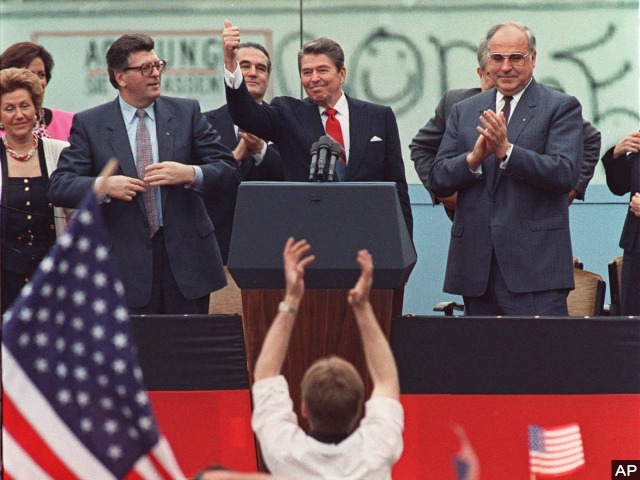On the 25th Anniversary of the Fall of the Berlin Wall, it’s easy to see the collapse of the Soviet Bloc as something that was inevitable. That’s essentially the way the event is being taught today at universities and colleges around the country. But it’s important for us all to recall that the collapse of the Soviet Bloc and that concrete edifice, the Wall, was not inevitable. It was the result of choices and decisions that were made by statesmen in the West, in particular President Ronald Reagan.
American foreign policy toward the Soviet Union during the Cold War had essentially been a policy of containment: hem the Kremlin in and try to stem its advance. To Ronald Reagan, this approach made no strategic sense. He likened it to a football coach adopting a policy of punting on first down whenever his team got the ball. It was a completely defensive strategy. And just like that approach would doom you to defeat in football, it was likely to do the same in geopolitics.
Reagan came into office with a view of going on the offense. A look at his now declassified National Decision Directives (NSDDs) reveals how the approach was different. NSDD-75, for example, shaped his policy toward the Soviet Union. NSDD-32 was the grand strategy. And NSDD-66 was his strategy for waging economic war on the Soviet bloc.
The fact that Reagan’s policy was unique, fresh, and went on the offensive is not something you need to take my word for. Just listen to what the Soviets were thinking. “Two features of Reagan’s policy toward the Soviet Union upset them [the Soviet leadership] most,” recalled Soviet Ambassador to the United States Anatoly Dobrynin. “One was his apparent determination to regain military superiority; the other, his determination to launch an ideological offensive against the Soviet Union, and foment trouble inside the country and among Soviet allies.”
The arms buildup created an enormous strain on the Soviets, who felt the need to try to keep up. KGB General Sergei Kondrashey, recalls that the Kremlin was frightened of the Strategic Defense Initiative (SDI), or “Star Wars.” SDI “influenced the situation in the country to such an extent that it made the necessity of seeking an understanding with the West very acute.”
Longtime Soviet Foreign minister Gromyko (nick-named “Grim Grom because of his stern demeanor) sat down in 1984 with former Senator George McGovern to discuss the sorry state of U.S.-Soviet relations. Grim Grom told McGovern that Reagan and his advisers “want to cause trouble… They want to weaken the Soviet system. They want to bring it down.” Days later, Gromyko visited the White House and chatted with Reagan. After denouncing the American defense buildup Gromyko told Reagan, “Behind all this lies the clear calculation that the USSR will exhaust its material resources before the USA and therefore be forced to surrender.” Indeed.
We are accustomed to seeing the horrific acts of history as the handiwork of evil individuals. The Second World War will forever be seen as a consequence of Hitler. The tens of millions who died in the Cultural Revolution in China died at the hands of Mao and his followers. The war between Radical Islam and the West will forever be directly tied to the actions of Osama Bin Laden.
But likewise, great victories need to be judged in the same manner. You cannot separate the victory over the Nazis from the heroism and wisdom of Winston Churchill. The preservation of the Union during the American Civil War was a direct consequence of Lincoln’s Leadership.
Likewise, the Berlin Wall did not randomly topple over. The hand of Reagan is visible.

COMMENTS
Please let us know if you're having issues with commenting.